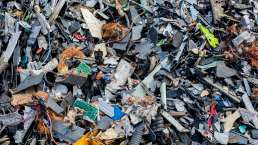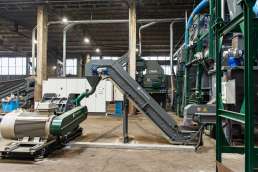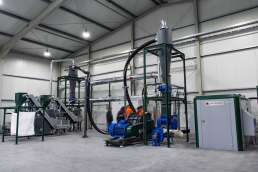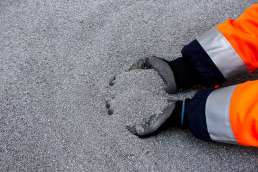The advantages of the Panizzolo Refining Islands
Do you want to optimise your recycling processes? Find out how the Panizzolo Refining Islands can revolutionise metal scrap processing, maximising recovery and efficiency.

A crucial challenge for the recycling industry
The recovery of metal fractions from composite waste is a major challenge for the recycling industry, especially when dealing with heterogeneous materials such as plastics, steels and highly wear-causing aggregates. According to data collected by Eurostat with reference to 2022, in Europe only 40.8% of waste is recycled, while 30.2% goes to landfill. This highlights the urgency of enhancing recovery processes, transforming waste into valuable resources to reduce dependence on virgin raw materials and mitigate the environmental impact. In this context, technological innovation is a key element, providing solutions that combine efficiency, sustainability and profitability. The Panizzolo Refining Islands are designed precisely to meet these needs, offering a high-level solution for the processing of metal waste.
Optimal recovery and output quality
A key aspect of the Panizzolo Refining Islands is their ability to guarantee optimal metal recovery, even from the most difficult waste, through entirely mechanical processes. For example, waste from car grinding and mixed metals may contain extremely small fractions of metal, which are difficult to separate with traditional technologies.
Thanks to the integration of patented components, the Refining Islands produce pure metal granules (copper, aluminium, brass, stainless steel), classifiable as Secondary Raw Materials and ready for marketing. This not only ensures a high economic value for the recovered material, but also reduces the amount of waste going to landfill, thus improving the overall environmental impact.
The Panizzolo Refining Islands combine advanced technology, modularity and production efficiency to maximise scrap recovery.
Advanced design
Every component of the Refining Islands has been designed with the objective of maximising recycling, putting technological innovation at the core of the production process. Each system integrates several cutting-edge technologies, including:
- State of the art hammer mills: the RAF series and TURBO series hammer mills guarantee uniform volumetric reduction and precise separation even in the most demanding processes, thanks to specific hammers and Panizzolo cast armours.
- TDP series densimetric separation tables: designed in-house, densimetric tables optimise airflow to ensure accurate separation of metals, improving the quality of the final product. They are energy-efficient and allow quick and easy access to components during periodic maintenance.

Modularity and flexibility: a strategic advantage
The Refining Islands offer wide modularity, which makes them particularly advantageous compared to traditional systems. First of all, this allows companies to configure the system according to their operational needs, both in terms of the amount of material to be processed and the type of waste. A further advantage is the possibility to expand or modify the system over time, adding new modules as required. This allows companies to seize new business opportunities and ensures an investment that remains profitable and competitive in the long run.
Compact design and cost reduction
In addition to operational flexibility, the compact design of the Refining Islands allows space optimisation, making them suitable even for companies with logistical limitations, without sacrificing production performance.
In terms of costs, the exclusive use of dry technology reduces energy consumption and minimises operating expenses. The design of the components ensures even wear, increasing the longevity of the machines and decreasing maintenance costs. This makes them of strategic importance for those who want to maximise profitability without compromising sustainability.

A solution for a wide range of waste
Another strength of the Refining Islands is their versatility. These systems can efficiently process a wide range of materials, including:
- Fluff from car grinding: one of the most difficult fractions to process, containing metal residue mixed with plastics and aggregates.
- Fluff from WEEE: a constantly growing waste category, which requires specialised solutions for the recovery of precious metals.
- Mixed metals and composites: derived from industrial processes or urban waste, often characterised by high complexity and the presence of contaminating materials.
The ability to process such diverse materials makes the Refining Islands an ideal solution for companies operating in different sectors, from vehicle demolition to electronic waste processing.
Sustainability and environmental impact
Panizzolo’s Refining Islands adopt a sustainable approach through totally mechanical dry processing cycles, which do not require the use of water or chemical additives. This choice eliminates the pollution risks associated with the traditional processes, reduces the environmental impact and preserves the quality of the processed materials. In addition, advanced dust removal and noise reduction systems ensure a healthier working environment that complies with the most stringent environmental regulations. Technological innovation, combined with production and energy efficiency, contributes to a circular economy model, offering companies an advanced and responsible solution for metal recovery.
